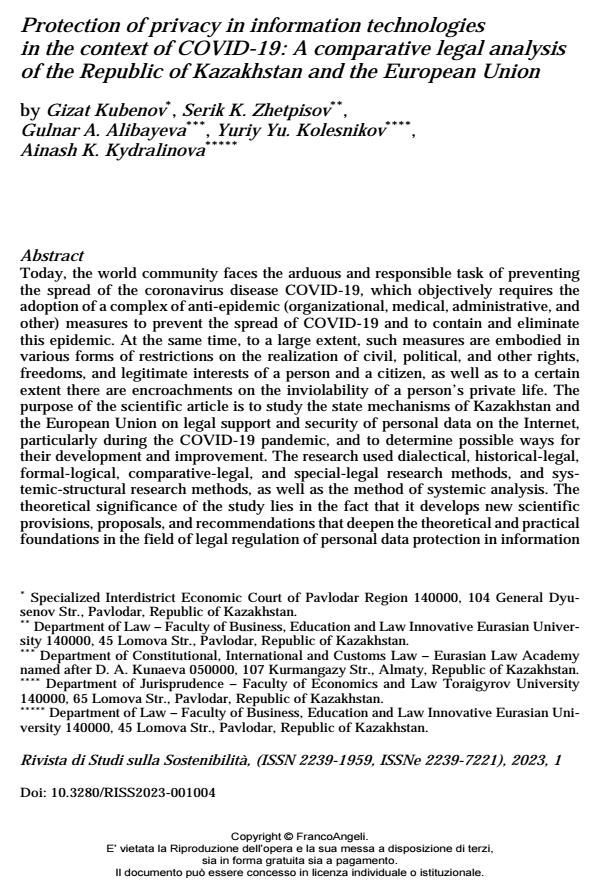Protection of privacy in information technologies in the context of COVID-19: A comparative legal analysis of the Republic of Kazakhstan and the European Union
Titolo Rivista RIVISTA DI STUDI SULLA SOSTENIBILITA'
Autori/Curatori Gizat Kubenov, Serik K. Zhetpisov, Gulnar A. Alibayeva, Yuriy Yu. Kolesnikov, Ainash K. Kydralinova
Anno di pubblicazione 2023 Fascicolo 2023/1
Lingua Inglese Numero pagine 27 P. 63-89 Dimensione file 125 KB
DOI 10.3280/RISS2023-001004
Il DOI è il codice a barre della proprietà intellettuale: per saperne di più
clicca qui
Qui sotto puoi vedere in anteprima la prima pagina di questo articolo.
Se questo articolo ti interessa, lo puoi acquistare (e scaricare in formato pdf) seguendo le facili indicazioni per acquistare il download credit. Acquista Download Credits per scaricare questo Articolo in formato PDF

FrancoAngeli è membro della Publishers International Linking Association, Inc (PILA), associazione indipendente e non profit per facilitare (attraverso i servizi tecnologici implementati da CrossRef.org) l’accesso degli studiosi ai contenuti digitali nelle pubblicazioni professionali e scientifiche.
Today, the world community faces the arduous and responsible task of preventing the spread of the coronavirus disease COVID-19, which objectively requires the adoption of a complex of anti-epidemic (organizational, medical, administrative, and other) measures to prevent the spread of COVID-19 and to contain and elimi-nate this epidemic. At the same time, to a large extent, such measures are embod-ied in various forms of restrictions on the realization of civil, political, and other rights, freedoms, and legitimate interests of a person and a citizen, as well as to a certain extent there are encroachments on the inviolability of a person’s private life. The purpose of the scientific article is to study the state mechanisms of Ka-zakhstan and the European Union on legal support and security of personal data on the Internet, particularly during the COVID-19 pandemic, and to determine possible ways for their development and improvement. The research used dialecti-cal, historical-legal, formal-logical, comparative-legal, and special-legal research methods, and systemic-structural research methods, as well as the method of sys-temic analysis. The theoretical significance of the study lies in the fact that it de-velops new scientific provisions, proposals, and recommendations that deepen the theoretical and practical foundations in the field of legal regulation of personal da-ta protection in information technologies during the pandemic in the European Un-ion in general and in the Republic of Kazakhstan in particular.
Parole chiave:privacy, COVID-19, privacy protection, privacy on the internet, Euro-pean Union.
- Vulnerability of personal data of Kazakhstani citizens and the need to implement the European experience Serik Zhetpissov, Nursulun Mussabekova, Gulnar Alibayeva, Olga Dubovitskay, Zhadyra Talipova, in RIVISTA DI STUDI SULLA SOSTENIBILITA' 2/2024 pp.305
DOI: 10.3280/RISS2024-002017
Gizat Kubenov, Serik K. Zhetpisov, Gulnar A. Alibayeva, Yuriy Yu. Kolesnikov, Ainash K. Kydralinova, Protection of privacy in information technologies in the context of COVID-19: A comparative legal analysis of the Republic of Kazakhstan and the European Union in "RIVISTA DI STUDI SULLA SOSTENIBILITA'" 1/2023, pp 63-89, DOI: 10.3280/RISS2023-001004